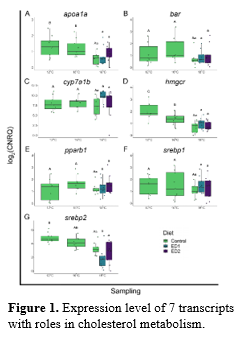IMPACT OF TEMPERATURE AND SUPPLEMENTAL DIETARY CHOLESTEROL ON TISSUE LIPID COMPOSITION AND HEPATIC TRANSCRIPT EXPRESSION OF FEMALE TRIPLOID ATLANTIC SALMON
With rising ocean temperatures due to climate change, the Atlantic salmon aquaculture industry must adapt farming practices to mitigate risk and maintain product quality. In this study, female triploid Atlantic salmon initially acclimated to 12°C were subjected to an incremental thermal challenge, wherein temperature was raised by 0.2°C day-1 to mimic summer sea-cage culture conditions; with temperature held at 16 and 18°C for several weeks to examine the effects of prolonged exposure to elevated temperatures. From 16°C onwards, the fish were fed either a control diet, or one of two nutritionally equivalent diets containing supplemental cholesterol [+1.30%, experimental diet #1 (ED1); or +1.76%, experimental diet #2 (ED2)]. Liver samples from a subset of fish were collected following an initial two weeks spent at 12°C, as the temperature reached 16°C, and at 18°C after the salmon had spent 65 days at elevated temperatures [i.e., 3 weeks at 16°C, followed by an increase at 0.2°C day-1 to 18°C (10 days), then 5 weeks at 18°C].
Temperature significantly impacted the level (mg g-1 wet weight) of several lipid classes (e.g., triacylglycerols, sterols, phospholipids) and fatty acids [e.g., arachidonic acid (ARA), eicosapentaenoic acid (EPA), docosahexaenoic acid (DHA)] in the liver of fish fed the control diet at 12, 16 and 18°C. With the exception of sterols, the above lipids/fatty acids were lower at 18°C compared with at 12 and/or 16°C. Interestingly, at 18°C phospholipid concentrations were higher, and DHA and omega-3 fatty acids (i.e., ? ω3) were greater in salmon fed ED2 as compared to the control diet. Transcript levels of 13 cholesterol/lipid metabolism-relevant genes were also measured using real-time qPCR. The expression of several transcripts (i.e., apoa1a, hmgcr, srebp2, elovl2, helz2a) was downregulated in the control group at 18°C compared to at 12 and/or 16°C. However, dietary treatment did not affect the expression of these transcripts at 18°C. Although analysis of fillet lipid/fatty acid composition is still ongoing, the present results indicate that temperature plays a greater role in regulating lipid metabolism than dietary cholesterol level.
Ultimately, this research shows that chronic exposure to high temperatures has consequences on the production of female triploid Atlantic salmon, as shown by the dysregulation of metabolic pathways and changes in lipid composition. Future studies should examine whether other diet formulations / functional feed ingredients can more effectively mitigate the potentially detrimental effects of high temperatures.
